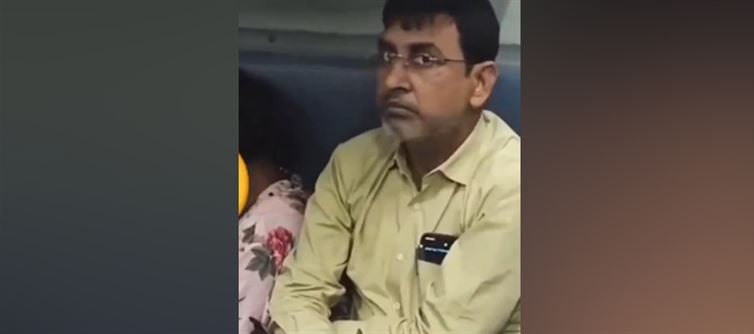
💥Two Crimes, One Hypocrisy
In the last 48 hours, two horrifying molestation cases rocked the nation.
One involved Shashi bhushan Upadhyay, who allegedly molested a minor girl on a train.
The other — Aqeel Khan, accused of molesting Australian women cricketers during their visit to India.
Both incidents are stomach-turning. Both are shameful. Both demand justice.
But what followed next revealed something uglier than either crime — India’s moral split-screen, where outrage is dictated not by the crime, but by the religion of the accused.
🚨 When Crime Becomes a Tool of Ideology
On social media, the reaction was swift — but not uniform.
The same voices that demanded Aqeel Khan’s arrest and trended hashtags about “foreign women’s safety” suddenly turned mute, even defensive, when the name Shashi bhushan Upadhyay surfaced.
Suddenly, excuses appeared:
“Maybe it’s false.”
“Don’t generalize.”
“He’s a nationalist, not like them.”
The same logic flipped depending on who the accused was.
When the perpetrator was Muslim, the story became about “Islamic mindset.”
When the perpetrator was Hindu, the story became about “one-off incident,” “agenda,” or “urban Naxals spreading lies.”
That’s not patriotism.
That’s rot disguised as righteousness.
💔 Molestation Has No Religion
A man who molests a child on a train doesn’t represent a religion.
A man who harasses international athletes doesn’t represent his community.
They both represent the decay of conscience.
Yet in today’s India, every crime is first filtered through a religious lens.
Not “what happened,” but “who did it” decides whether people feel outrage or silence.
That’s how justice dies — not in the courts, but in our timelines.
🧠 Selective Outrage: The Real National Shame
True citizens called out both incidents — demanding arrest and justice for all victims.
But the Sanghi ecosystem, deeply invested in identity politics, only raged about Aqeel Khan while defending Shashi bhushan Upadhyay.
The message was clear: Condemnation is conditional. Morality is negotiable.
When you choose silence for “your side,” you don’t protect your faith — you pollute it.
When you defend a molester because he shares your ideology, you’re no longer a patriot — you’re an enabler of crime.
🪞 The Mirror We Refuse to Face
Every nation has criminals. What defines a nation is how it reacts to them.
Do we punish them equally, or defend them selectively?
Scroll through X (Twitter) and you’ll see the hypocrisy unfold in real time —
Hundreds of tweets demanding “justice” for crimes committed by Muslims,
and hundreds mocking, deflecting, or denying similar crimes committed by Hindus.
This isn’t justice. This is propaganda warfare wearing moral clothes.
Nationalism Isn’t About Sides — It’s About Standards
Calling out one criminal while defending another doesn’t make you a nationalist.
It makes you a hypocrite.
True nationalism means defending the victim, not the perpetrator.
It means standing for justice, not for your ideology’s image.
Because a country that can’t call out its own wrongs isn’t strong — it’s weak, scared, and hollow inside.
⚖️ Justice Must Be Religion-Blind
Both Aqeel Khan and Shashi bhushan Upadhyay must face the same fate — swift arrest and trial.
Both must be treated as criminals, not symbols of faith.
If we want to build a civilized nation, the rule is simple:
Condemn every crime. Support every victim. Period.
Anything less, and we become a mob with flags, not citizens with conscience.
🔚 Final Word: Choose Humanity, Not Hashtags
When ideology replaces empathy, justice becomes a joke.
When we start defending monsters because they belong to “our side,”
we don’t just fail the victims — we fail the idea of India.
So before you tweet, trend, or justify, ask yourself:
“If the religion of the accused was different, would I still feel the same outrage?”
If the answer is no,
then it’s not the nation that’s broken —
It’s you.




 click and follow Indiaherald WhatsApp channel
click and follow Indiaherald WhatsApp channel